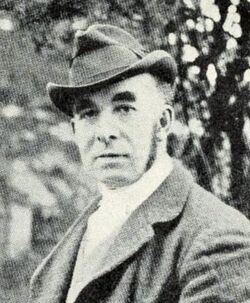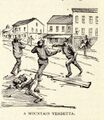Marquess of Queensberry Rules (nonfiction): Difference between revisions
(Created page with "The '''Marquess of Queensberry rules''' is a code of generally accepted rules in the sport of boxing (nonfiction). == Description == They were named so because John Doug...") |
No edit summary |
||
| (4 intermediate revisions by the same user not shown) | |||
| Line 1: | Line 1: | ||
The '''Marquess of Queensberry rules''' is a code of generally accepted rules in the sport of | [[File:John_Douglas_9th_Marquess_of_Queensberry.jpg|250px|thumb|John Sholto Douglas, 9th Marquess of Queensberry (20 July 1844 – 31 January 1900) was a Scottish nobleman, remembered for lending his name and patronage to the "Marquess of Queensberry Rules" that formed the basis of modern boxing and for his role in the downfall of author and playwright Oscar Wilde.]]The '''Marquess of Queensberry rules''' is a code of generally accepted rules in the sport of boxing. | ||
They were named so because John Douglas, 9th Marquess of Queensberry publicly endorsed the code, although they were written by a sportsman named John Graham Chambers. | They were named so because John Douglas, 9th Marquess of Queensberry publicly endorsed the code, although they were written by a sportsman named John Graham Chambers. | ||
| Line 9: | Line 7: | ||
The Queensberry rules are intended for use in both professional and amateur boxing matches, thus separating it from the less popular American Fair Play Rules, which were strictly intended for amateur matches. | The Queensberry rules are intended for use in both professional and amateur boxing matches, thus separating it from the less popular American Fair Play Rules, which were strictly intended for amateur matches. | ||
In popular culture the term is sometimes used to refer to a sense of | In popular culture the term is sometimes used to refer to a sense of sportsmanship and fair play. | ||
== | == In the News == | ||
<gallery mode="traditional"> | |||
File:Mountain vendetta.jpg|link=Havelock|Mountain vendetta. No Queensbury Rules in this murderous fight. Prone figure in foreground is [[Havelock]].</gallery> | |||
== Fiction cross-reference == | == Fiction cross-reference == | ||
== External links | * [[Havelock]] | ||
== Nonfiction cross-reference == | |||
* [[Perfidy (nonfiction)]] | |||
* [[War (nonfiction)]] | |||
* [[Weapon (nonfiction)]] | |||
External links: | |||
* [https://en.wikipedia.org/wiki/Marquess_of_Queensberry_Rules Marquess of Queensberry Rule] @ Wikipedia | * [https://en.wikipedia.org/wiki/Marquess_of_Queensberry_Rules Marquess of Queensberry Rule] @ Wikipedia | ||
[[Category:Nonfiction (nonfiction)]] | |||
Latest revision as of 10:04, 29 June 2016

The Marquess of Queensberry rules is a code of generally accepted rules in the sport of boxing.
They were named so because John Douglas, 9th Marquess of Queensberry publicly endorsed the code, although they were written by a sportsman named John Graham Chambers.
The code of rules on which modern boxing is based, the Queensberry rules were the first to mention gloves in boxing.
The Queensberry rules are intended for use in both professional and amateur boxing matches, thus separating it from the less popular American Fair Play Rules, which were strictly intended for amateur matches.
In popular culture the term is sometimes used to refer to a sense of sportsmanship and fair play.
In the News
Mountain vendetta. No Queensbury Rules in this murderous fight. Prone figure in foreground is Havelock.
Fiction cross-reference
Nonfiction cross-reference
External links:
- Marquess of Queensberry Rule @ Wikipedia
